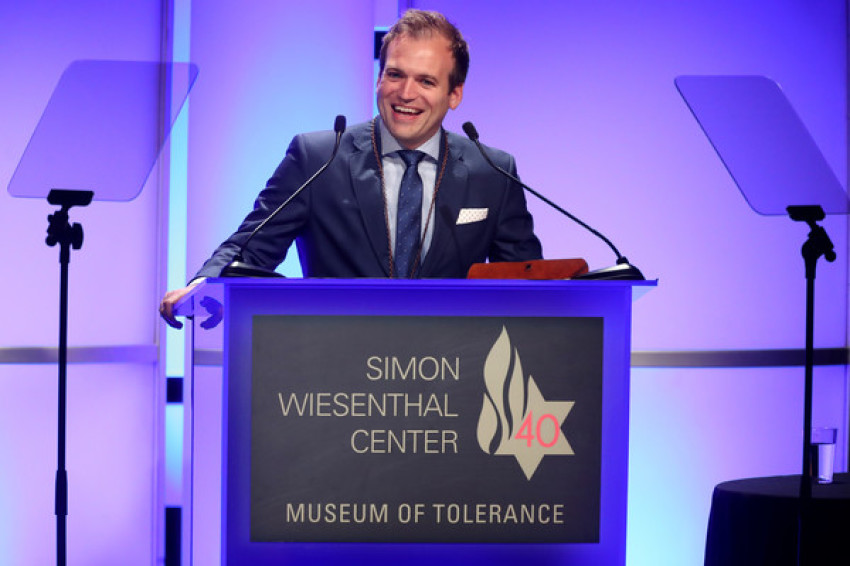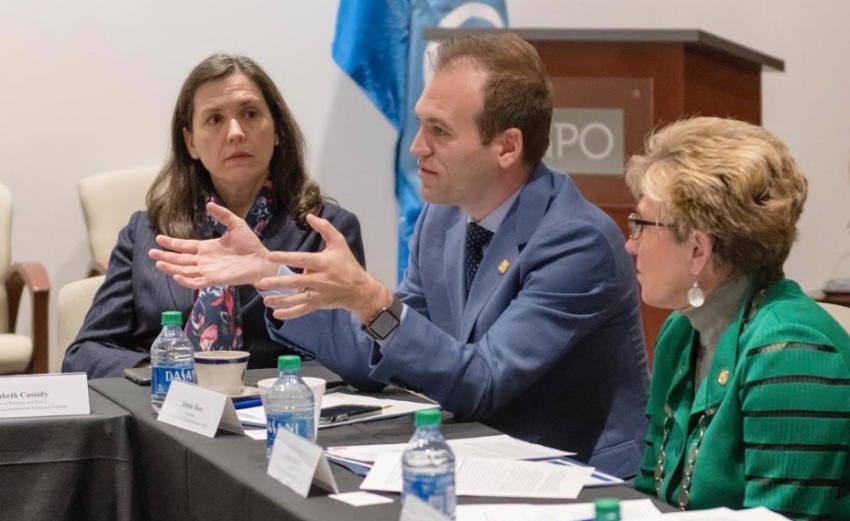US evangelical leader Johnnie Moore sanctioned by China for religious freedom advocacy

China sanctioned a United States private citizen and evangelical leader on Wednesday for exposing human rights abuses and standing up for the religious freedom of Uyghur Muslims, Christians and other minority faith groups that are being silenced and oppressed.
Rev. Johnnie Moore, a two-time commissioner who served on the U.S. Commission on International Religious Freedom and president of the Congress of Christian Leaders, said it is an “honor” to be sanctioned by China because of his advocacy for people of oppressed minority faiths.
“If the cost of sanctioning Chinese officials responsible for human rights abuses in China is the sanctioning of activists like me, then I say, ‘fine, I am more than happy to be sanctioned,’” Moore told The Christian Post in an interview on Thursday.
Moore, a public relations executive and a former Liberty University vice president, said there is “no better compliment for a human rights activist to actually get under the skin of those you are calling to change.”
“It’s literally millions of people like me around the world who are saying in one clear voice, ‘we love China, we love the Chinese people,’” he said. “‘We understand it is a certain type of political system. But these types of behaviors are not the types of behaviors we’re willing to accept in the modern world, and we’re going to be unrelenting.' And clearly, [China is] paying attention.”
As a human rights advocate who shines a light on atrocities, it sometimes seems to go unnoticed. But for China, Moore said it has become “increasingly clear” that the government is “noticing that the tide of the world is finally turning against them in this regard. They are deeply, deeply concerned about it."
“It is an honor to be sanctioned by the Chinese Communist Party for giving my voice to the Uyghur Muslims, Christians [including Jimmy Lai], Tibetan Buddhists & countless others the CCP tries to silence every day," he shared in a tweet.
Moore called his ability to freely advocate for the oppressed "a privilege of living in the United States, the land of the free and the home of the brave."
“The CCP doesn’t understand the difference between ‘the truth’ and a ‘lie' but here’s some truth we know: they are weaker than they want us to believe that they are,” Moore continued. “A global coalition is building to hold them to account and it transcends political parties and U.S. administrations. This Great Wall of Collaboration is a promise to future generations that we will not hand our world to the CCP to victimize the innocent as they please.”
???????? pic.twitter.com/LJakSQH2gv
— Rev. Johnnie Moore ? (@JohnnieM) May 26, 2021
Secretary of State Antony Blinken released a statement on Thursday promising the U.S. will “continue to speak out for human rights” and “promote accountability” for the Chinese government’s abuses.
“Beijing’s attempts to intimidate and silence those speaking out for human rights and fundamental freedoms, including freedom of religion or belief, only draw additional international attention and scrutiny to its egregious abuses,” Blinken said.
“This includes the ongoing crimes against humanity and genocide in Xinjiang, as well as its repression of religious and spiritual adherents, including Tibetan Buddhists, Christians, and Falun Gong practitioners."
Blinken condemned the Chinese government’s “baseless sanctions” imposed in March against USCIRF Chair Gayle Manchin and Vice-Chair Tony Perkins for speaking out against the genocide and human rights abuses of Uyghur Muslims.
Moore’s service as a USCIRF commissioner ended several weeks ago, so the CCP sanctioned him as a private citizen in response to the State Department’s release of the 2020 Report on International Religious Freedom and the announcement of sanctions of a Chinese official.
China's Foreign Ministry Spokesperson Zhao Lijian said the 2020 report is a “disregard of facts and fraught with ideological bias, has unscrupulously denigrated China's religious policy and severely interfered in China's internal affairs.”
Lijian said China “firmly rejects” the report, which led them to impose sanctions on Moore. China “urges the U.S. side to rectify its mistake, rescind the so-called sanctions and stop interfering China's internal affairs in the name of religious issues.”
Lijian said in a press conference on Wednesday that China sanctioned Moore “in response to the [U.S.’] blatant move to endorse cults and impose unilateral sanctions on Chinese personnel based on lies and disinformation.”
The sanction forbids Moore and his family members from entering mainland China, Hong Kong and Macao of China
Moore said the sanction “is partly a retaliatory measure, it’s partly a PR stunt and it’s partly about intimidation.”
“One of the key phrases in my official statement in response to [the sanction] is that the United States of America is the land of the free," Moore said. “It’s the home of the brave. We have always used our freedom as not only something to enjoy in the boundaries of our own country but as our responsibility in the world to use our freedom on behalf of those who don’t have it.”

“ ... We haven’t been easily intimidated in the history of our great country. Despite all of the different parts of our history, there is one thread that runs through it, which is that we are a brave, proud people who are obsessed with self-corrections within our own history and who are always raising our voice on the behalf of those that need [it] around the world. So, I think it is partly an exercise in intimidation. But we’re not an easily-intimidated people,” he continued.
Moore said the sanctions will not silence him.
“If by sanctioning Americans you’re attempting to silence us, the exact opposite thing’s going to happen,” Moore shared. “Sanctioning me is not going to silence me. It’s going to cause me to become more aggressive. It’s going to cause me to raise my voice more. As best as I can tell, this is simply a travel ban.”
Moore assured that he loves China and has for years displayed a willingness to "sit at the table" and "have these conversations."
“I am not against the Chinese people. I am not against China. I’m an American. I believe in the free market. … But when you believe in the free market, you have to fight fair. And one of the reasons the United States of America has been blessed the way it has been is [that] it has been the freest country in human history and it has taken that freedom and it has used it to raise a voice for those who aren’t free.”
Former Secretary of State Mike Pompeo and 27 other Trump administration officials, including former Health and Human Services Secretary Alex Azar, former national security adviser Robert O'Brien and former White House Chief Strategist Steve Bannon, were also sanctioned by China just minutes after President Joe Biden took office.
The sanctions restricted these individuals, their immediate family members and companies or institutions associated with them from entering mainland China, Hong Kong and Macao of China since they “seriously disrupted China-U.S. relations,” a Jan. 20 statement from a Chinese Foreign Ministry spokesperson said.
The Trump administration designated the Chinese persecution of the minority Uyghur Muslims as a “genocide” and “crimes against humanity” against in January.
In the western Xinjiang province, the Uyghur and other ethnic Muslims undergo mass internment, forced labor and forced sterilization under the Chinese Communist Party.
Moore met with the transition teams between the Trump and Biden administrations in January to discuss religious freedom and human rights.
“The United States needs to use its unrivaled stature in the world to build an alliance beginning in Europe but extending certainly throughout the continents … to further build this ‘great wall of collaboration’ to serve as a wall of freedom that ensures that China cannot buy its way, extort its way, lend its way and engage in other extortionist tactics in order to buy alliances throughout the world. …,” Moore said.
The government of China must change its behavior, or the U.S. will continue to try to stifle its influence throughout the world, Moore added.
“... The last thing that I want is a bad relationship between the U.S. and China. I think the U.S. and China ought to tomorrow decide to turn a page on recent days and to pursue a fairer, more just approach to their relationship and to their joint efforts around the world in shaping the future for everyone," he said. "But the Communist Party is going to have to change their behavior. And if they are unwilling to change their behavior, then the United States needs to do what needs to be done to make it more difficult for the Communist Party to export their behavior to other parts of the world.”
Moore believes the Biden administration should “take a page out of the Trump administration’s playbook” and “keep unrelenting pressure on the Communist Party” and sanction those responsible for the atrocities being committed.
Human rights and religious freedom must be “at the heart of American foreign policy,” he stressed.
Chrisitan persecution watchdog group Open Doors USA ranks China, the world’s most populous country with over 1.4 billion people, at No. 17 on its 2021 World Watch List of countries where Christians face the most severe persecution.
Emily Wood is a reporter for The Christian Post. She can be reached at: emily.wood@christianpost.com



























